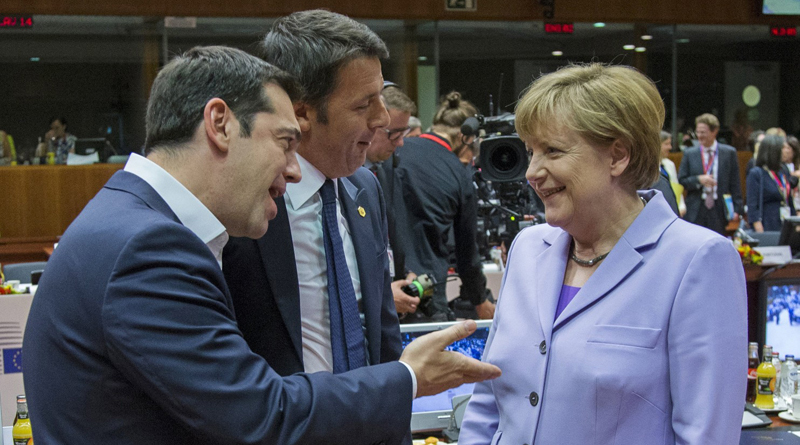
The Globalist: The costs of absorbing five million immigrants could easily reach the costs of German reunification — over one trillion euros over 30 years. Until last summer, nothing could be done in Europe without Germany’s consent. The whole eurozone had to embark on a policy of austerity, reforms were imposed and at the height of the last Greek drama, Wolfgang Schäuble, the German finance minister, could even propose a Grexit.
Being the economic and financial powerhouse of Europe and the biggest creditor country gave Germany unprecedented power.
That period has come to a rapid end now, leading to a 180 degree change in Germany’s position: It has moved from being the taskmaster to becoming a humble(d) petitioner.
Euro and open borders poorly made
As the saying goes, the opposite of “good” is “well intended.” European politicians implemented the Euro without giving it the proper base in an economic and fiscal union.
The inevitable crisis is currently contained by the largesse of the ECB. But it will return to the political stage with a vengeance, at least as soon as the next recession hits (which may not be far).
Europe’s other mega-sized problem is its idea of open borders, as agreed in the Schengen Agreement, was implemented without ensuring a functioning border control and implementing a European policy for immigration and asylum.
As with the eurozone crisis earlier, the refugee crisis making the headlines these days is again the result of these poorly implemented policies.
The politicians who are now claiming that it would be impossible to return to different currencies and implementing functioning border controls are ultimately underscoring the fundamental incompetence (or lack of forthrightness and honesty) of Europe’s political elite.
Germany has become the prime destination for most refugees. According to current estimates, well beyond one million migrants will arrive in Germany alone in 2015.
Experts are already discussing numbers of up to 10 million immigrants until 2020.
The tale of the economic benefit
Until now, the German public has supported the policy of open borders and humanitarian help, although this support is waning pretty fast.
A majority of Germans are afraid to publicly state unease with the immigration wave. Politicians point to benefits in the context of the demographic development – Germany has had one of the lowest birth rates in the western world for some decades – and therefore the need to attract immigrants.
They describe the wave of refugees, who are mainly young and male, as a salvation to Germany’s demographic problems.
A simple calculation makes it clear that this is nothing more than wishful thinking. A modern economy like Germany’s is in need of qualified immigrants — or at least immigrants who can be educated to a considerable skills level.
Although a small number of well-educated people have arrived in Germany, the majority of the refugees lack the necessary education and qualification.
The relatively high minimum wage of 8.50 euros per hour will make it very difficult to integrate these low skilled people into the workforce.
The economic benefit for Germany comes down to a simple calculation. What is the share of productive migrants who will actually be working for their living, paying taxes and making contributions to social security systems?
Also, what is the average income of these people — and what, in contrast, are the yearly costs of non-productive refugees?
This chart shows a simulation for one million migrants, assuming 25,000 euros of costs per non-productive refugee and a 40% total tax paid by productive refugees (remember, Germany is a country with high taxes and steep social charges).
The numbers indicate the net costs/benefits in billions of euros per year.
Obviously, highly optimistic assumptions are necessary to make immigration a net positive to Germany’s economy.
If the share of productive immigrants and/or the average income is low, then the costs of absorbing five million immigrants could easily reach the costs of German reunification — over one trillion euros over 30 years.
As the German government is far from ready to do what is necessary to increase the number of productive refugees, one has to assume the most costly outcome.
Significant political risks
As the refugee crisis lingers on, it becomes more and more visible that the promises that politicians made to the population at large will not be fulfilled. Worse, the impression that the German government has lost control of the situation is true.
The German government will try to get the crisis under control by reducing the number of new migrants and, at the same time, freeing up further capacities to provide shelter to those who arrive.
In order to reduce the number of newcomers, the German government has already given up principles of the past, such as keeping its distance to Turkey.
Mrs. Merkel even went as far as meeting President Erdogan amid the Turkish election campaign.
She also promised billions of euros of support if Turkey helps to slow down the stream of migrants and even signaled willingness to allow visa-free travel and, over time, membership of Turkey in the EU. All this in spite of the significant human rights issues in Turkey.
Thanks to the refugee issue, Greece will also get the debt forgiveness it was not offered this past summer, provided it improves its border control and keeps refugees in camps on its islands instead of sending them further into Europe.
As Germany tries to free up capacity for actual refugees from war, it will become stricter in sending back those who are not coming for humanitarian but rather economic reasons. In addition, Germany will beg its European partners to accept more refugees.
That is a steep task, considering that the British government has accepted 20,000 refugees over a period of four years – equal the number of refugees arriving in Germany every day.
France has accepted 1,500 refugees so far, equal to the number of refugees who arrived in the little town of Kempten in Bavaria already some weeks ago.
In exchange, Germany’s European partners will come up with a long list of wishes, should they even be prepared to consider the German request for support.
After all, Germany has, according to their view — which is shared by more and more Germans – caused the crisis with its failed policies itself.
What will be on the list? On the top of that list is a fundamental reversal of the eurozone policy of past years:
An end to Stability Pact
Italy and other countries ask that the costs for the refugee crisis not count in the official deficit numbers.
This – of course – does not change the fact that unsustainable debt continues to become even higher.
Implementation of a transfer union
The crisis countries of Europe and France have lobbied for years to implement a transfer union in Europe. Now this topic will become a more pressing matter.
This is the flipside of Germany asking for “solidarity” on the refugee issue. In this context, it is irrelevant that studies show that a transfer union would not be enough to fix the problems of the euro.
Eurozone parliament
It is a long-standing wish, especially of the French, to set up a eurozone parliament with the power to vote on spending programmes and economic policy for the eurozone.
As the receiving countries would command a solid majority, this would mean more government spending, funded mainly by Germany (or so the assumption goes).
Monetization of debt
As even the politicians in Brussels cannot overcome economic principles, debt burdens will become unbearably high pretty soon.
Then, the pressure will mount on the ECB to solve the problem by monetizing the debt. Germany will have no lever to object, given its desperate need for help in the refugee crisis.
This all comes down to significant costs for Germany and the average German taxpayer, who – as I described here – is by no means a winner of the euro.
Given the choice between refugees storming train stations in winter, broadcast widely on TV screens, versus spending hundreds of billions for other countries over time, German politicians — and especially Mrs. Merkel — will always choose to spend.
They see the latter as much more intangible and obscure, relieving them from political pressure from the population at large.
In doing so, however, they waste the wealth of our nation. From taskmaster to paymaster (and not just petitioner) would therefore be the most appropriate title for this article.














